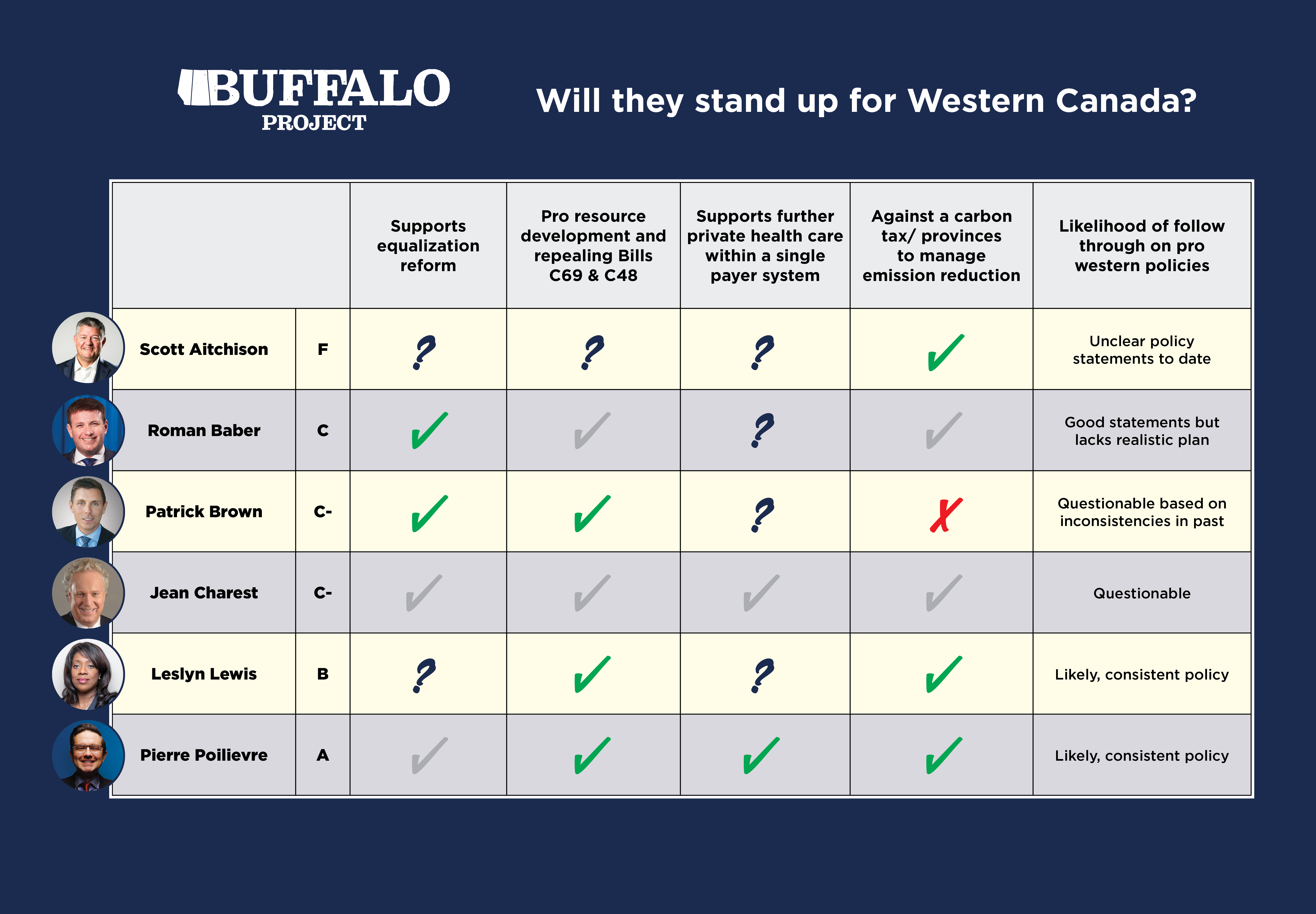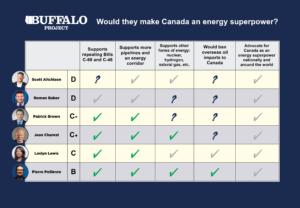UPDATED MAY 12, 2022: The Buffalo Project is grading Conservative Party Leadership candidates to provide a sense of who can be trusted to address western concerns.
We grade the candidates based on their public statements but also on their likelihood to keep their promises by considering past actions, voting history and their record of keeping commitments.
Actions always speak louder than words.
Western concerns have too often been ignored for political expediency in other parts of Canada.
At such a critical time for our national unity, we cannot allow this trend to continue.
NOTE: We may update these grades as the campaign progresses and more information becomes available.
Scott Aitchison
GRADE: F
No mention of western issues after a month of campaigning.
Aitchison has spoken out against a carbon tax but hasn’t been clear on if he would allow provinces to manage their own emission reduction plans.
All other messaging from Aitchison so far have been mostly generic. We may be able to upgrade his grade as the campaign progresses, but currently it’s a fail.
Roman Baber
GRADE: C
Baber is starting to come out with policies important to westerners. He has spoken out against the carbon tax but hasn’t said whether provinces would be allowed to manage their own emissions plans.
Baber is pro resource development but hasn’t been clear about how he would build pipelines and what legislation would be changed.
On May 11, 2022, Baber even said he would abolish equalization and reduce income taxes instead.
While his statement is exciting for some, it appears to lack an understanding of Canadian federalism. The federal government can reform equalization but could only abolish it with a constitutional amendment requiring agreement from seven provinces representing 50 per cent of the population. That is considered impossible in Canada today, especially regarding equalization.
Thus, many feel Baber either lacks understanding on western fairness or is simply providing hallow political statement for votes.
Baber strong stances are welcomed but his policies don’t feel ready for prime time. His grade now sits at a respectable C.
Patrick Brown
GRADE: C-
Brown presented “A Plan for Western Canada” when visiting Calgary early in his campaign. Find that policy statement here: https://fighterleaderwinner.ca/en/a-plan-for-western-canada/
In the statement, he committed to only appointing elected Alberta Senators, greater equality of regional representation on parliamentary and cabinet committees, fixing “the unjust equalization program”, repealing bills C-69 and C-48 and working hard to increase investment in our energy sector.
His policy statements are strong and welcomed. However, many remain skeptical of Brown as he has a history of going back on his commitments after public pressure from media and political opponents.
Brown was against a carbon tax when running for Ontario PC leader only to confirm after he won the leadership that he would implement a carbon tax in Ontario.
He was also found guilty on two occasions of breaking Ontario’s Integrity Act.
Thus, there is great concern Mr. Brown may say one thing during a leadership race and do another for political expediency later – much like what happened with the last Conservative Leader with disastrous results.
While his statements for Western Canada are positive, Brown’s past actions diminish his trust and therefore grade to a below average C-.
Jean Charest
GRADE: C–
Charest has been upgraded from D- to C- as of May 3, 2022. He recently made several announcements of interest to Western Canada, including:
– More private health care options within the public system giving provinces additional autonomy
– Plans to repeal Bills C-69 and C-48
– Discussion of excluding non-renewal resources from the equalization formula
– Cancelling the consumer carbon tax
Mr. Charest is a smart politician and by making these statements, he is checking all the boxes to receive support in the West.
But many westerners would contend that even if Charest promised to support pro-western policies, the likelihood of him keeping his promises is low.
Charest was a Liberal Premier of Quebec and has close ties with many federal Liberals.
He implemented a carbon tax in Quebec, supported the Liberal carbon tax just a few weeks ago, and raised consumption taxes in Quebec while Premier. He also supported the Liberal long-gun registry, a longstanding grievance of many Westerners.
While Charest may indeed be a friend of Western Canada, most still view him as a “go with the flow” politician who is more interested in political expedience than fighting for principled change.
Charest sudden change in language and policy is a case in point.
While talk is cheap, the talk has been constructive. Thus, we’ve upgraded Charest from a D- to a C-.
Leslyn Lewis
GRADE: B
Lewis appears to be committed to western Canada. She is pro energy, would repeal bills C-69 and C-48 and is against a carbon tax.
Many would like to hear more from Lewis if and how she would reform equalization and handle private health care within Canada.
She has been consistent on her policy statements and seems unlikely to break promises due to public pressure. Lewis earns an above average grade of B.
Pierre Poilievre
GRADE: A
Poilievre was born and raised in Calgary and holds a close affinity to Western Canadians. His public statements on western issues check all the boxes.
Known as a stronger orator with his short pithy statements, he’s said, under a Poilievre government, western Canadians will no longer have to “pay up and shut up” when talking about equalization reform.
He said he will only appoint senators elected in Alberta, he would cancel the carbon tax and allow freedom for provinces to create their own environmental plans. He supports more private health care and more freedom for provinces in general.
Poilievre is also strongly pro-Canadian energy and said he would “build pipelines in all directions.”
His voting record and convictions make it unlikely he would break his promises.
The only area of concern is a lack of detail around how he would reform equalization. Additionally, some worry about his electability in other parts of Canada because of his strong Western Canadian positions.
However, Poilievre’s message of “taking back control of your life” and “making Canada the freest nation on earth” is resonating across the country with young and old, so the above concerns may become irrelevant.
For all these reasons, Poilievre takes top spot. Grade: A





